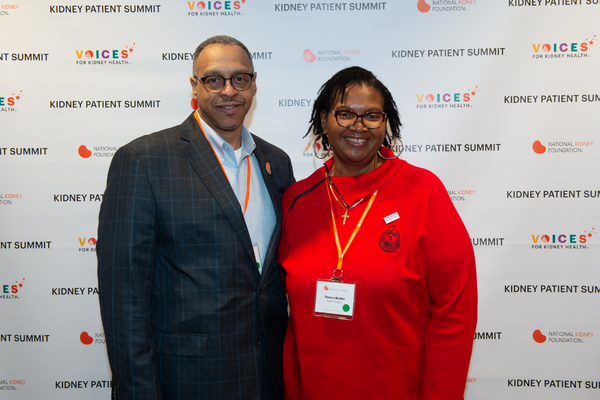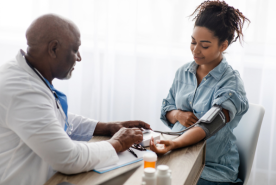August 09, 2023
Cuando Thelma tenía apenas 12 años, empezó a tener hinchazón en las manos y los pies. Pero, sin seguro de salud, su familia tuvo que recurrir a clínicas gratuitas en busca de ayuda. Debido a las inequidades sistémicas que enfrentó de niña, tuvo que pasar casi una década para que recibiera un diagnóstico. Incluso entonces, no iba a recibir la educación adecuada que necesitaba para ayudar a conservar la función renal.
Hoy en día, es una ferviente defensora de todas las personas con enfermedad renal, especialmente de los afroamericanos y aquellos de escasos recursos económicos. Siga leyendo para conocer la increíble historia de Thelma e infórmese sobre la crucial importancia que tiene el acceso igualitario a atención médica de calidad y trasplantes para todos.
El diagnóstico de nefropatía por IgA (NIgA) de Thelma
Thelma se crio en una zona empobrecida donde las familias no tenían seguro médico y debían recurrir a las clínicas gratuitas. Estos factores, o determinantes sociales de la salud, pueden dificultar el acceso a atención médica y preventiva de calidad.
"En la clínica gratuita me dijeron que tenía que bajar de peso, pero nunca me hicieron ningún análisis o prueba de nada", dice Thelma. "La gente daba por sentado que, porque somos afroamericanos, comíamos pollo frito y no nos ocupábamos bien de nuestro cuerpo. No siempre podíamos pagar la mejor calidad, pero mi mamá siempre nos preparaba comidas saludables".
Este ciclo se prolongó por casi una década hasta que Thelma se graduó en la universidad y pudo tener un seguro de salud privado.
"Pienso que los médicos no nos toman en serio porque somos afroamericanos. Mi mamá no entendía la información médica y crio sola a seis hijos, así que aceptaba lo que le aconsejaban los médicos", dice Thelma. "Es triste, pero solemos sentir que no podemos contradecir a la gente con autoridad, como los médicos y la policía. Por fin me sentí empoderada cuando terminé la universidad y ya no era una niña a la que se podía desestimar".
Para entonces, la veinteañera Thelma fue al médico con síntomas similares a la gripe. Esta vez, tenía la educación y la experiencia necesarias para hacerse valer. Finalmente sus problemas de salud quedaron expuestos cuando un análisis de orina reveló la presencia de proteína en la orina. Después de descartar otras enfermedades, un nefrólogo confirmó que tenía NIgA con un rápido deterioro de la función renal.
"Cuando vives en la pobreza y tienes que depender del seguro del gobierno como Medicaid o las clínicas gratuitas, te preguntas si realmente están a tu disposición para ayudarte porque no te dan un diagnóstico. Me duele porque todo esto se podría haber tratado cuando era niña", dice Thelma. "Lo supe en 1993 cuando me gradué de la universidad y pensaba que me iba a comer el mundo. Entonces, de repente, tenía NIgA y nadie me había enseñado qué podía hacer para ayudar a retrasar su avance".
Obtenga más información sobre Medicare.
El camino a un doble trasplante
En 1998 la función renal de Thelma bajó tanto que se vio en la disyuntiva de tener que empezar a hacer diálisis o recibir un trasplante. Afortunadamente, varios miembros de su familia eran compatibles, pero su hermana era la mejor opción para Thelma y se ofrecía como voluntaria. Se estaban preparando para el trasplante cuando su madre falleció inesperadamente.
"El proceso del duelo puso todo en suspenso. Ella falleció en septiembre y tuve que ir a diálisis en noviembre, no tenía otra alternativa", dice Thelma. "Empecé la diálisis, hicimos el duelo y luego nos reorganizamos. Mi hermana me recordó que mi madre hubiera querido que retomáramos el camino. Unos meses después, me donó su riñón cuando cumplí 30 años".
Con un riñón nuevo, Thelma obtuvo su título universitario en comunicación, consiguió un trabajo en una destacada teledifusora y empezó a trabajar en una estación de radio: "El trasplante me devolvió la vida. Ya no estaba atada a una máquina y podía volver a vivir".
El riñón nuevo duró más de 10 años hasta que empezó a perder su función.
"Los síntomas de la NIgA volvieron en 2007, pero ese es también el momento en el que fui bendecida con el milagro de mis mellizos. El médico me recomendó que siguiera adelante con un solo bebé porque era un embarazo de alto riesgo y ya tenía signos de preeclampsia", dice Thelma. "Antes había tenido dos abortos espontáneos, así que iba a hacer lo que fuera por tener a los bebés. Hice reposo en cama y me hicieron muchas ecografías, pero lo valió. Los niños nacieron a las 29 semanas, pasaron unos meses en el hospital y hoy en día están hermosos".
Volvió a diálisis después del nacimiento de sus hijos y quedó inscrita en la lista de espera de varios centros de trasplantes de toda la costa este.
"Fui bendecida con un segundo trasplante en marzo de 2011", dice Thelma. "El héroe desconocido es un caballero que se sometió a una cirugía y lamentablemente no lo logró. Ese día me salvó la vida a mí y a otra mujer".
En defensa de los trasplantes para todos

El hospital omitió decir que el donante de Thelma tenía citomegalovirus, una infección viral común.
"No es algo demasiado grave, pero no me lo dijeron hasta que llegué al hospital. Estaba pasmada porque el medicamento que iba a necesitar para mantener el trasplante y no contraer el citomegalovirus costaba $1000", dice Thelma. "Yo tenía ese dinero y una familia que me podía ayudar, pero no es así para todo el mundo. Otra persona quizás tendría que haber rechazado el trasplante por no poder pagar el medicamento".
Thelma averiguó sobre programas de asistencia para medicamentos para poder seguir costeando el suyo y se pregunta por qué los profesionales de la salud no hablan sobre estos programas de entrada.
"En lo que respecta a los trasplantes, los médicos parecen tener la idea de que a los afroamericanos no se les debe plantear hacer un trasplante porque no pueden pagarlo", dice Thelma. "El trasplante no fue el tratamiento primario que me ofrecieron, especialmente en el primero que me hicieron. Solo me hablaron de la diálisis. Me parece que eso les pasa a muchos pacientes afroamericanos y negros por toda la gente con la que hablé en el centro de diálisis. Más allá de que como afroamericano o caucásico uno pueda pagar el medicamento o no, la primera pregunta debería ser '¿cómo podemos ayudarlo?'".
Thelma no espera que las políticas de enfermedad renal y trasplantes cambien, pero sí asumió el desafío personal de luchar por la igualdad en la esfera de la enfermedad renal como defensora de Voices for Kidney Health. Bregó durante años por la Ley de Protección de Donantes Vivos, que prohíbe a las compañías de seguro negar la cobertura o aumentar las primas a los donantes vivos de órganos, y la Ley de Cobertura Integral de Medicamentos Inmunosupresores para Pacientes Trasplantados de Riñón, para garantizar que todos los receptores de trasplantes tengan acceso a los medicamentos que necesitan para proteger su nuevo riñón.
"Gran parte del trabajo que hago como defensora es a través de la National Kidney Foundation. La Ley de Protección de Donantes Vivos es muy importante para mí porque, al igual que mi hermana, todos los donantes vivos dan un riñón por pura bondad y no deben ser penalizados con primas por salvar una vida", dice Thelma. "También sabemos que los medicamentos son fundamentales para el éxito de los trasplantes de riñón y finalmente logramos que los medicamentos inmunosupresores estén cubiertos mientras el riñón viva".
Todavía hay mucho por hacer, pero Thelma desea que todos los que están luchando con la enfermedad renal tengan esperanza y perseveren.
"Soy una paciente crónica, madre y esposa. Es difícil, pero esa es mi vida. Aprendí a ser creativa para disfrutar de la vida. Durante años dejé que la enfermedad me controlara. Yo no era la que tenía el control y dejé escapar sueños que podría haber perseguido más allá de la enfermedad renal", dice Thelma. "No hay que dejar que la enfermedad renal te controle o te impida disfrutar de la vida. Uno tiene el poder de controlarla”.
Vea cómo puede actuar hoy para mejorar el acceso igualitario a la atención médica.


















